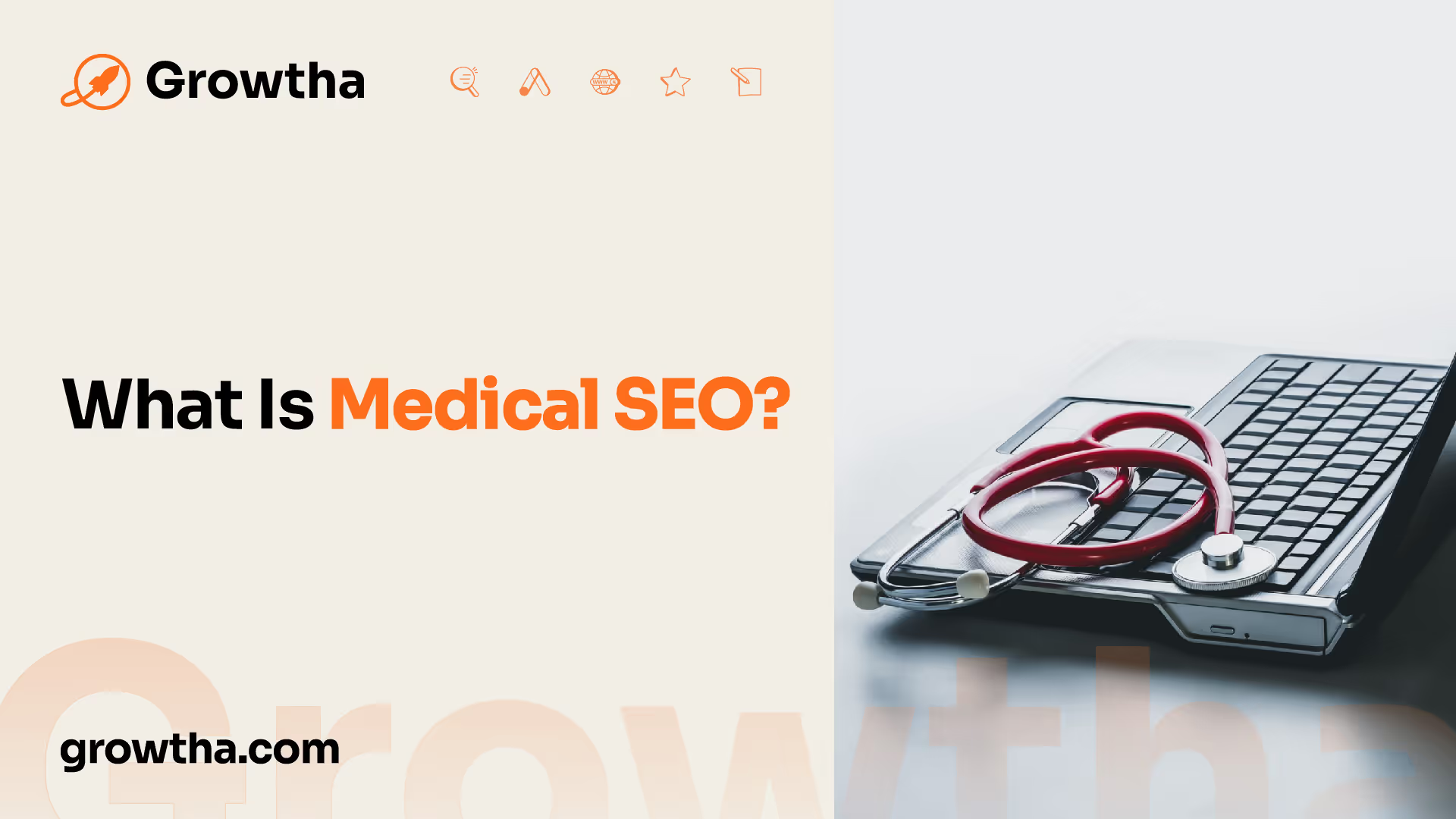What Is Medical SEO?
Medical SEO refers to the practice of optimizing a healthcare facility's online presence to increase visibility, attracting more attention from search engine users.


What Is Medical SEO?
Understanding Medical SEO
Medical SEO, or healthcare SEO, refers to the practice of optimizing a healthcare facility's online presence to increase visibility and attract more attention from search engine users. It involves implementing various strategies and techniques to improve a healthcare provider's organic search rankings and drive targeted traffic to their website.
What is Medical SEO?
Medical SEO is essentially the virtual roadmap that determines how a healthcare business appears in search engine results and is ranked by search engines. It involves optimizing a website's content, structure, and technical aspects to make it more search engine-friendly and relevant to users' search queries. By utilizing medical SEO strategies, healthcare providers can improve their online visibility and increase their chances of being found by potential patients.
Importance of Medical SEO
In today's digital age, search engines play a crucial role in helping individuals find healthcare services and providers. When people search for medical information or healthcare services, they often turn to search engines to gather information and make informed decisions. This is where medical SEO comes into play.
- Quality Leads and Targeted Traffic: One of the main benefits of medical SEO is that it brings quality leads directly to a healthcare provider's website, driving targeted traffic and contributing to the growth of their practice. By optimizing their online presence, healthcare providers can attract individuals who are actively seeking their services, increasing the likelihood of conversion.
- Patient Education and Expertise Showcase: Medical SEO helps in patient education by publishing relevant content through blogs and articles. This not only improves search engine rankings but also serves as an opportunity to showcase expertise and provide valuable information to patients. By establishing themselves as a reliable source of information, healthcare providers can build trust and credibility [1].
- Authority and Trust Building: Establishing authority and trust through medical SEO is crucial for increasing a practice's visibility. Websites that secure top positions in search engine result pages are considered valuable resources by search engines, leading to more trust from users. By consistently implementing effective medical SEO strategies, healthcare providers can enhance their online reputation and build credibility among potential patients.
Medical SEO offers numerous benefits for healthcare providers, enabling them to attract targeted traffic, establish authority, and increase their online visibility. By implementing effective medical SEO strategies, healthcare providers can improve their chances of being found by potential patients, ultimately contributing to the growth and success of their practice.
Benefits of Medical SEO
Implementing medical SEO can bring numerous benefits to healthcare providers, helping them grow their practice and attract more patients. Let's explore some of the key advantages of medical SEO.
Quality Leads and Targeted Traffic
One of the main benefits of medical SEO is that it brings quality leads straight to the website, driving targeted traffic and increasing the likelihood of converting visitors into valuable leads. By optimizing their website with relevant keywords and providing valuable content, healthcare providers can attract individuals who have a genuine interest in the services they offer. This targeted traffic increases the chances of acquiring new patients who are actively seeking healthcare solutions [2].

Patient Education and Expertise Showcase
Medical SEO plays a crucial role in educating patients and providing them with valuable information. By publishing relevant content through a blog or other resources, healthcare providers not only improve their search engine ranking but also have an opportunity to showcase their expertise. This allows patients to gain insights, understand their conditions better, and make informed decisions regarding their healthcare. It establishes trust and positions healthcare providers as reliable sources of information [1].
Authority and Trust Building
Establishing authority and trust is vital for healthcare providers, and medical SEO helps in achieving that. Websites that secure top positions on search engine result pages are considered valuable resources by search engines, leading to increased visibility and more trust from users. By consistently delivering high-quality content, healthcare providers can build authority in their field and establish a strong reputation, which in turn attracts more patients and sets them apart from competitors.
By leveraging medical SEO strategies, healthcare providers can drive targeted traffic, educate patients, and build trust and authority in their field. These benefits contribute to the growth of their practice, increase online visibility, and ultimately attract more patients who are in need of their services.
Components of Medical SEO
To effectively optimize a healthcare website for search engines, it is essential to understand the key components of medical SEO. These components include on-page SEO, local SEO, off-page SEO, and technical SEO.
On-Page SEO
On-page SEO focuses on optimizing individual pages of a website to improve their visibility in search engine results. This involves conducting proper keyword research, especially targeting specific keywords related to medical conditions, treatments, and services that potential patients may search for [3]. By strategically placing these keywords in page titles, headings, meta tags, and content, healthcare providers can increase their chances of ranking higher in search engine results.
Local SEO
Local SEO is crucial for healthcare providers as many patients prefer providers in their local area. Approximately 46% of all Google searches seek local information [3]. To improve local visibility, healthcare providers should optimize their Google Business Profiles, ensuring accurate and up-to-date information such as address, phone number, and business hours. Additionally, encouraging patients to leave online reviews can boost local search rankings and attract more patients.
Off-Page SEO
Off-page SEO plays a vital role in building trust and credibility with potential patients. This component involves tactics like building high-quality backlinks from reputable sources, encouraging online reviews, and optimizing Google Business Profiles [3]. Positive online reviews and endorsements from authoritative websites can significantly impact a healthcare provider's reputation and visibility in search engine results.
Technical SEO
Technical SEO in the healthcare industry focuses on optimizing a website's technical elements to improve search engine rankings and ensure potential patients can easily access the needed information. This includes optimizing website speed, security, mobile responsiveness, and user experience. Healthcare providers should also pay attention to Google's guidelines, particularly the Your Money or Your Life (YMYL) rules that apply specifically to websites related to health and finances. Adhering to these guidelines is crucial for maintaining a strong online presence and ranking in search engine results [4].
By incorporating these components into their SEO strategies, healthcare providers can improve their online visibility, attract targeted traffic, and establish their authority and trustworthiness in the healthcare industry. It is important to regularly monitor and adjust these components to stay competitive in the digital landscape.
Strategies for Effective Healthcare SEO
To achieve success in healthcare SEO, implementing effective strategies is essential. By employing these strategies, healthcare providers can improve their online visibility, attract targeted traffic, and establish authority in their field. Here are four key strategies for effective healthcare SEO:
Keyword Research and Content Creation
Keyword research is a fundamental component of healthcare SEO. It involves identifying the specific keywords and phrases that potential patients are using to search for healthcare services. By understanding their search intent, healthcare providers can create targeted and relevant content that addresses their needs and concerns.
Through keyword research, healthcare providers can uncover valuable insights into the topics and questions that potential patients are searching for. By incorporating these keywords strategically into their website content, blogs, and other online resources, healthcare providers can optimize their website for search engines and attract organic traffic.
Optimizing HTML Tags and Site Architecture
Optimizing HTML tags and site architecture is crucial for healthcare SEO. By optimizing title tags, meta descriptions, headers, and other HTML elements, healthcare providers can improve their website's visibility and search engine rankings. These optimizations help search engines understand the structure and relevance of the website's content, making it easier for them to index and rank the site [5].
Properly optimized HTML tags provide concise and accurate information about the content on each page, making it easier for search engines to display relevant snippets in search results. Additionally, well-structured site architecture ensures that search engines can navigate and understand the hierarchy of the website's pages, improving overall visibility and user experience.
Building Backlinks and Online Reviews
Building backlinks from reputable sources and encouraging online reviews are effective strategies for healthcare SEO. Backlinks from authoritative websites signal to search engines that the healthcare provider's website is trustworthy and valuable, leading to higher search engine rankings. Healthcare providers can actively seek out opportunities for guest blogging, partnerships, and collaborations with other reputable websites in the healthcare industry to build a strong backlink profile [3].
Online reviews also play a significant role in healthcare SEO. Positive reviews from satisfied patients can contribute to building trust and credibility, both for search engines and potential patients. Encouraging patients to leave reviews on platforms such as Google My Business, Yelp, and healthcare-specific review sites can help healthcare providers establish a positive online reputation and attract more organic traffic.

Tracking Results and Growth
Tracking the results of SEO efforts and maintaining growth is vital in healthcare SEO. By regularly monitoring key metrics such as website traffic, keyword rankings, and conversion rates, healthcare providers can gain insights into the effectiveness of their SEO strategies. This ongoing analysis and optimization ensure that the healthcare provider's online presence continues to attract relevant traffic and generate quality leads [6].
By utilizing web analytics tools, healthcare providers can track the performance of their website, identify areas for improvement, and make data-driven decisions to optimize their SEO strategies. Regular monitoring and analysis allow healthcare providers to stay ahead of the competition, adapt to changing search trends, and continuously improve their online visibility and search engine rankings.
Implementing these strategies for effective healthcare SEO can help healthcare providers enhance their online presence, attract quality leads, and establish authority in their industry. By combining keyword research, content creation, HTML tag optimization, backlink building, online reviews, and ongoing analysis, healthcare providers can optimize their website for search engines and deliver valuable content to their target audience.
Key Considerations in Healthcare SEO
When it comes to healthcare SEO, there are several key considerations that can significantly impact the success of your online presence. These considerations include E-A-T guidelines, YMYL pages, mobile optimization, and local SEO implementation.
E-A-T Guidelines
E-A-T stands for Expertise, Authoritativeness, and Trustworthiness, which are crucial factors when it comes to webpages containing medical information. According to Search Engine Journal, the information provided on medicine and health must be top-notch and filled with expertise, authoritativeness, and trustworthiness in order to have a chance of ranking well in the healthcare industry.
To optimize your healthcare website for E-A-T, it's important to provide high-quality, accurate information on medical topics. This can be achieved by following E-A-T guidelines and ensuring that your content is written by credible experts in the field. By prioritizing E-A-T, you can build trust with your audience and establish your website as a reliable source of healthcare information.
YMYL Pages
YMYL (Your Money or Your Life) pages refer to any content that can directly affect a reader's health, finances, or safety. These pages require high levels of expertise, authoritativeness, and trustworthiness to rank well in search results. According to Search Engine Journal, if the content on YMYL pages doesn't meet these standards, such as having inaccuracies or being thin on information, it will have a harder time ranking in search results.
When optimizing YMYL pages for healthcare SEO, it's crucial to ensure that the content is comprehensive, accurate, and backed by credible sources. This includes providing detailed information about medical procedures, conditions, and treatments, and addressing any potential risks or side effects. By adhering to high E-A-T standards, you can increase the visibility and credibility of your healthcare website.
Mobile Optimization
In today's mobile-centric world, mobile optimization is essential for any website, including healthcare websites. Mobile optimization refers to the process of ensuring that your website is user-friendly and easily accessible on mobile devices. With the increasing number of people using smartphones and tablets to search for healthcare information, having a mobile-friendly website is crucial for reaching your target audience.
To optimize your healthcare website for mobile, consider factors such as responsive design, fast loading times, easy navigation, and clear readability on smaller screens. By providing a seamless mobile experience, you can enhance user engagement and improve your website's search engine rankings.
Local SEO Implementation
For healthcare practices that serve a specific local area, implementing local SEO strategies is vital. Local SEO focuses on optimizing your website to appear in local search results when potential patients search for healthcare services in your area. This can significantly increase your visibility and attract local patients to your practice.
Some key components of local SEO implementation for healthcare include optimizing your Google My Business listing, ensuring accurate and consistent NAP (Name, Address, Phone Number) information across online directories, and generating positive online reviews. By targeting local keywords and optimizing your website for local search, you can improve your online presence and attract more local patients.
By considering these key aspects of healthcare SEO, you can enhance your website's visibility, authority, and trustworthiness. Implementing strategies aligned with E-A-T guidelines, optimizing YMYL pages, prioritizing mobile optimization, and focusing on local SEO can help you reach your target audience effectively and grow your online presence in the healthcare industry.
References
[1]: https://clictadigital.com/the-medical-seo-benefits-to-grow-your-medical-practice/
[2]: https://www.omnicoreagency.com/benefits-of-healthcare-seo/
[3]: https://www.linkedin.com/pulse/3-core-components-strong-healthcare-seo-strategy-digitalismedical
[4]: https://www.searchenginejournal.com/healthcare-seo-fundamentals-grow-medical-practice/384563/







